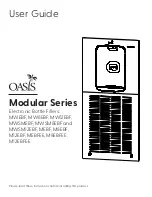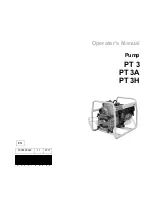
A2CH3 F16 – OPERATING INSTRUCTIONS
INDEX DATE N°
00 06/02/09
DC69020
5/16
IV – Applications
IV.1 – Chemical compatibility
All pump wetted parts are manufactured in
TEFLON
®
and are suitable for pumping even the most
corrosive concentrated chemicals: H
2
SO
4
, HNO
3
, HF, H
3
PO
4
, HCl, NH
4
OH, KOH, NaOH, CH
3
COOH,
TMAH, H
2
O
2
...
The viscosity of the liquids must be less than 100 cpo. Please contact us for higher values.
Very abrasive liquids are not recommended.
Please call either the factory or your local distributor if you require information on chemical
compatibility.
IV.2 – Temperature range
The pump can handle liquids from 32°F (0
°
C) up to +185°F (+85
°
C).
When the fluid temperature is greater than 140°F (60
°
C) you must adjust the supply pressure (see
attached scheme) and you must frequently check that the 4 manifolds (P/N 9366-100) are fully tight.
For special applications call SGPPL FRANCE or your local distributor.
For higher temperature range, a "high temperature" version of the pump is also available. Please
contact us to help you define which product fits your requirement.
IV.3 – Limitations of use
For a correct use of the pump, you MUST not:
•
Connect the pump inlet or outlet with air, nitrogen or liquid under pressure,
•
Use lubricated and/or wet air/ nitrogen,
•
Have an air line length between the pump and air pressure regulator higher than 10 feet or
3 meters,
•
Use the pump with air pressure less than 29 PSI or 2 bar, or greater than 72.5 PSI or 5 bar
(except with technical agreement),
•
Restrict suction side (valves, filters...),
•
Exceed the recommended liquid temperatures (please contact us),
•
Pump too viscous or abrasive liquids.
•
Run the pump dry for more than 10 minutes.
You must follow your local Health and Safety Regulations with regard to particular chemicals,
and act in conformity with the internal safety procedures of your own company.
Any of the above may be detrimental to the normal operation and life expectancy of the pump
and may invalidate the warranty.
If the pump is being used with very corrosive chemicals or if it is left for extended periods not in use,
we recommend the system is emptied and flushed.
V – Maintenance
V.1 – Initial checking steps
If the pump stops for any reason check:
•
The air/nitrogen supply,
•
That all valves in the chemical lines are open.
If the pump starts, check that the following was not the cause:
•
The air/nitrogen connections (See Diagram 1),
•
The air/nitrogen quality,
•
When was the pump maintained for the last time?



































